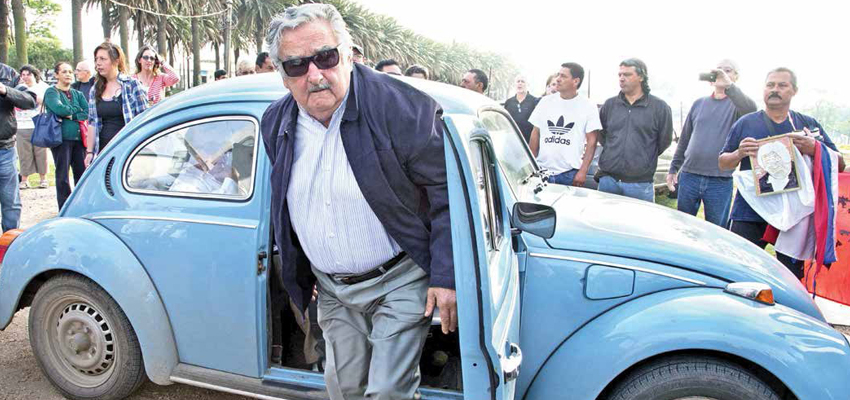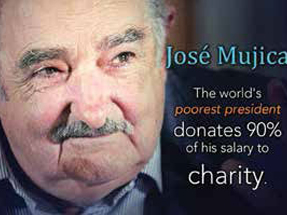World’s Poorest President!

“Simplicity is not leading a very simple life with bountiful wealth and luxury that one can lay hands-on, but building no desire to have surplus resources in spite of living in abject penury situations.”
—Anuj Somany

This man was the World’s Poorest President, but the reason why he is poor will surprise you! José Alberto "Pepe" Mujica Cordano (Spanish pronunciation: [xoˈse muˈxika]) is a Uruguayan politician who was President of Uruguay between 2010 and 2015. José donated more than 90% of his $12,000 monthly salary to benefit the poor and help small entrepreneurs. If we need more of anything in this world, it would be more people like this! There are idealistic, hard-working and honest politicians the world over although cynics might argue that they are a small minority but none of them surely comes anywhere close to the former Uruguayan President when it comes to living by one's principles. This man doesn’t have value for his own appearance or clothes. José puts more value on other things in life instead. Before his presidency, he was a guerilla fighter for Tupamaros, which acted like “Robin Hood.” They literally robbed banks, gun clubs, and other businesses to give to the poor. He truly believed that his personal value was in evidence not by way of gaining more money, but in ensuring the well-being of his country and its people.
Let’s take a look at the bizarre sequence of events in the life of José before he became President of Uruguay. In 1970 he was arrested but soon escaped Punta Carretas prison in a daring jailbreak. He was shot and wounded numerous times in conflicts with security forces. In 1972 he was imprisoned again, after which he remained in jail for more than a decade, including two years' solitary confinement at the bottom of a well. In 1985 when constitutional democracy was restored in Uruguay, he was released under an amnesty law. In 1994 when he was elected deputy, he surprised everyone by reaching the parliament building on a Vespa scooter. A bewildered parking attendant asked: "Are you going to be here long?” A confident Mujica replied: "I certainly hope so."
Mujica was Minister of Livestock, Agriculture, and Fisheries from 2005 to 2008 and a Senator afterwards. As a candidate of the Broad Front, he won the 2009 presidential election and took Oath of Office as President on 1 March 2010. After winning the Presidential election, he surprised everyone by announcing that the presidential palace would be included among the state shelters for the homeless.
Mujica was entitled to live in the beautiful Presidential house, but chose a more humble place to live in. He chose to reside at his ramshackle farm situated a few miles away from the country's capital city of Montevideo. The only sign the country's leader was at home was the pair of police officers and his 3-legged dog Manuela, who stood guard at the end of his heavily tractor-rutted dirt track. Water comes from a well which is surrounded by overgrown weeds and the laundry goes not in a tumble-dryer but on the washing line outside.
He is an honest example of a President who gives up his own comfort for the wellbeing of others. His part-time farming job keeps him aware of the struggles and life that most other people of his country go through. He also grows on his farm and then sells them. 'This is a matter of freedom. If you don't have many possessions then you don't need to work all your life like a slave to sustain them, and therefore you have more time for yourself,” he says. In contrast to many western politicians who aim to amass property empires, Mr Mujica in 2014 declared his total assets at just £135,000.
"I have a way of life that I don’t change just because I am a President. I earn more than I need, so it’s my duty to help others"
He says, “My lifestyle is a consequence of my wounds. I’m a son of the soil. There have been years when I would have been happy just to have a mattress.” This President’s example is a testament to how we should live our lives. We don’t need more things to be happy. In fact, some of the wealthiest people in the world have their wealth stored in the currency of unselfishness, kindness and true love.
Wearing what could best be described as "casual" clothes, he’s never been seen wearing a tie. No wonder, Mr Mujica sits on a simple wooden stool in front of a bookshelf that seems on the verge of collapsing under the weight of biographies and mementoes from his political adversaries and allies. Books are important to the former guerrilla fighter who spent a total of 13 years in jail. It was an experience that almost broke him mentally and shaped his transformation from fighter to politician. “I’ve no doubt that had I not lived through that, I would not be who I am today. Prison and solitary confinement had a great influence on me. It helped me find my inner strength. I couldn't even read a book for about eight years.” Given his past, it is perhaps understandable why Mr Mujica gives away about 90% of his salary to charity, simply because he "has no need for it".
He married Lucia Topolansky, his long-term partner and former co-revolutionary, in 2005. Not afraid to take a swipe at his fellow leaders, he adds: "All I do is live like the majority of my people, not the minority. I'm living a normal life.” In a 2012 interview with BBC, he explained: “I’m called ‘the poorest President’, but I don’t feel poor. Poor people are those who only work to try to keep an expensive lifestyle, and always want more and more,” he says. “I have a way of life that I don’t change just because I am a President. I earn more than I need, so it’s my duty to help others.”
While most ex-presidents travel around in chauffeur-driven luxury cars, the former Uruguayan president drove his own beat-up Beetle. He was even offered $1m for the car by an Arab Sheikh, but he didn’t give the offer “any importance”. He chooses to fly economy class. His magnanimity can be seen when he gives ‘a lift’ to hitchhikers. It’s not often you get picked up by a world leader, but when Gerhald Acosta was walking between his hometown and his place of work, he was given a ride by Mujica and his wife. The shocked hitchhiker told a local newspaper that it was only when he got into the car -the President's iconic 1987 blue Volkswagen Beetle that he recognised the elderly couple. “When I got out, I thanked them profusely, because not everyone helps someone out on the road, and much less a President.”
Mr Mujica, who is sometimes described as the "President every other country would like to have," dismisses all the adulation and attention with a wave of his hand, but he is not leaving the stage just yet. Maybe so, but this enigmatic leader remains an inspiration to many and is a reminder that politics is meant to be a humble and honourable profession.
While neighbouring Argentina and Brazil have suffered downturns in recent years, Uruguay has witnessed rising salaries and a historically low unemployment rate. Mr Mujica left the office with Uruguay's economy in better shape than its bigger neighbours. Poverty rates fell sharply while he was in office, and he famously launched the ‘One Laptop per Child’ programme, which to date has distributed more than 1 million free laptops to children and teachers around the country. The world-renowned Mujica left the office with a 65% approval rating, making him one of the world’s most popular Presidents. But he will perhaps continue to be Uruguay’s most famous President, having amplified its reputation as one of the most progressive countries in the region through his humble lifestyle and social legislation. He left the presidency the same way he entered it driving his '87 Beetle.